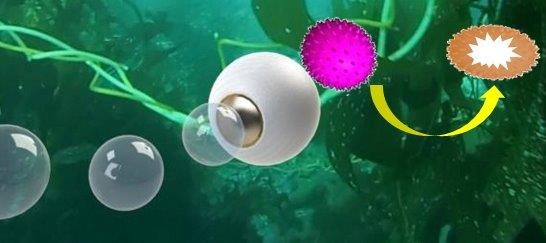FOR IMMEDIATE RELEASE
ACS News Service Weekly PressPac: October 29, 2014
Microrockets fueled by water neutralize chemical and biological warfare agents
With fears growing over chemical and biological weapons falling into the wrong hands, scientists are developing microrockets to fight back against these dangerous agents, should the need arise. In the journal ACS Nano, they describe new spherical micromotors that rapidly neutralize chemical and biological agents and use water as fuel.
Joseph Wang and colleagues point out that titanium dioxide is one of the most promising materials available for degrading chemical and biological warfare agents. It doesn’t require harsh chemicals or result in toxic by-products. Current approaches using titanium dioxide, however, require that it be mixed in whatever solution that needs to be decontaminated. But there’s no way to actively mix titanium dioxide in waterways if chemical and biological agents are released into the environment. So scientists have been working on ways to propel titanium dioxide around to accelerate the decontamination process without the need for active stirring. But approaches so far have required fuel and other compounds that hinder neutralization. Wang’s team wanted to fix this problem.
To give titanium dioxide a source of thrust, the researchers coated it over a magnesium sphere core. When put in a watery environment, a single hole in the shell allows water to enter and react with the magnesium core. This produces hydrogen gas, which bubbles out and propels the titanium dioxide through the surrounding liquid. This enables it to more efficiently and rapidly contact and degrade harmful agents. When tested, the micromotors successfully neutralized nerve agents and anthrax-like bacteria in considerably less time compared to titanium dioxide microparticles that aren’t propelled.
The authors acknowledge funding from the Defense Threat Reduction Agency and the University of California, San Diego.
###
The American Chemical Society (ACS) is a nonprofit organization chartered by the U.S. Congress. ACS’ mission is to advance the broader chemistry enterprise and its practitioners for the benefit of Earth and all its people. The Society is a global leader in promoting excellence in science education and providing access to chemistry-related information and research through its multiple research solutions, peer-reviewed journals, scientific conferences, eBooks and weekly news periodical Chemical & Engineering News. ACS journals are among the most cited, most trusted and most read within the scientific literature; however, ACS itself does not conduct chemical research. As a leader in scientific information solutions, its CAS division partners with global innovators to accelerate breakthroughs by curating, connecting and analyzing the world’s scientific knowledge. ACS’ main offices are in Washington, D.C., and Columbus, Ohio.
To automatically receive press releases from the American Chemical Society, contact newsroom@acs.org.
Note: ACS does not conduct research, but publishes and publicizes peer-reviewed scientific studies.

View larger image

